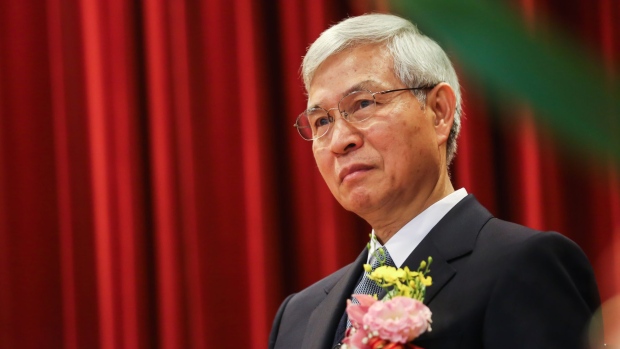Oct 5, 2022
Taiwan Intervenes in FX Again as Reserves Fall Most Since 2012
, Bloomberg News

(Bloomberg) -- Taiwan’s central bank intervened again in September to smooth the local dollar’s slide against the surging greenback as foreign exchange reserves declined for a third month -- the longest stretch since 2016.
The central bank “stepped in to smooth out volatile capital flows to maintain an orderly foreign exchange market,” the monetary authority said in a statement Wednesday. It has acknowledged intervention in each of the past four months.
The announcement came as the monetary authority reported that foreign reserves fell $4.38 billion from August to $541.11 billion -- the biggest month-on-month drop since 2012. That decline was partly due to changes in the value of the central bank’s other currency holdings against the US dollar, it said in a statement.
The Taiwan dollar fell the most in 25 years in the quarter ended Sept. 30. It was the second-worst performance in Asia after South Korea’s won, with global funds selling over $10 billion of Taiwan stocks, according to Bloomberg data. While the period saw threats to the island from China, the outflows were mainly due to the US rate hikes, central bank Governor Yang Chin-long said last month, saying the flood “needs to be channeled” since it can’t be stopped.
“Asian central banks might have to keep up their direct and indirect FX intervention to slow the depreciation of their currencies,” Bloomberg Intelligence said in a report this week.
Japan spent almost $20 billion dollars in September to prop up the yen. South Korea sold a net $15.4 billion US dollars in the three months through June, the Bank of Korea said last week.
If October sees a fourth monthly decline in Taiwan’s foreign exchange reserves, that would be the longest fall since a four-month stretch in 2008, during the global financial crisis.
Taiwan’s economy has continued to expand through the pandemic, thanks in part to strong tech exports -- though global demand has been slowing in recent months, clouding the outlook for the rest of the year.
The central bank’s Yang told lawmakers last week that the monetary authority can handle capital outflows, and underlined that foreign exchange controls will not be adopted while he is governor.
Taiwan’s central bank often steps in to “smooth” currency market volatility by either buying or selling US dollars to release liquidity. It sold a net $8.25 billion in the first half of 2022 to slow the depreciation of the Taiwan dollar, having bought a net $9.12 billion in the FX market in 2021 and $39.1 billion in 2020, when the local currency rose to the strongest level in decades.
“Volatility in markets in the first half was pretty big, and we smoothed out the market,” said Eugene Tsai, the head of the central bank’s foreign exchange department, at a Wednesday press conference. “We are capable of coping with volatility in the markets.”
©2022 Bloomberg L.P.





